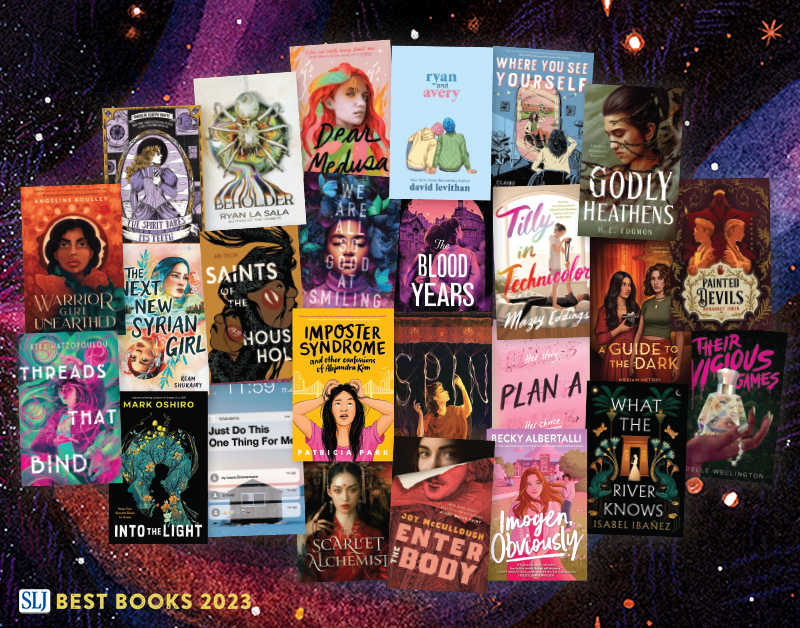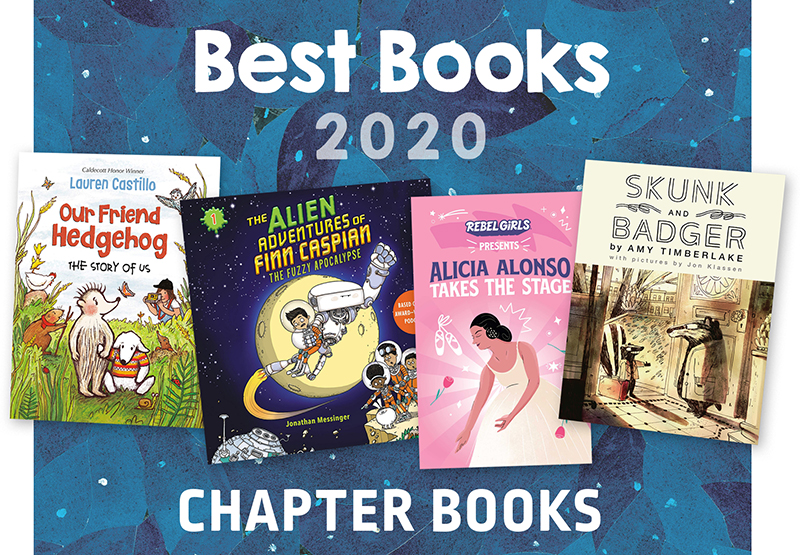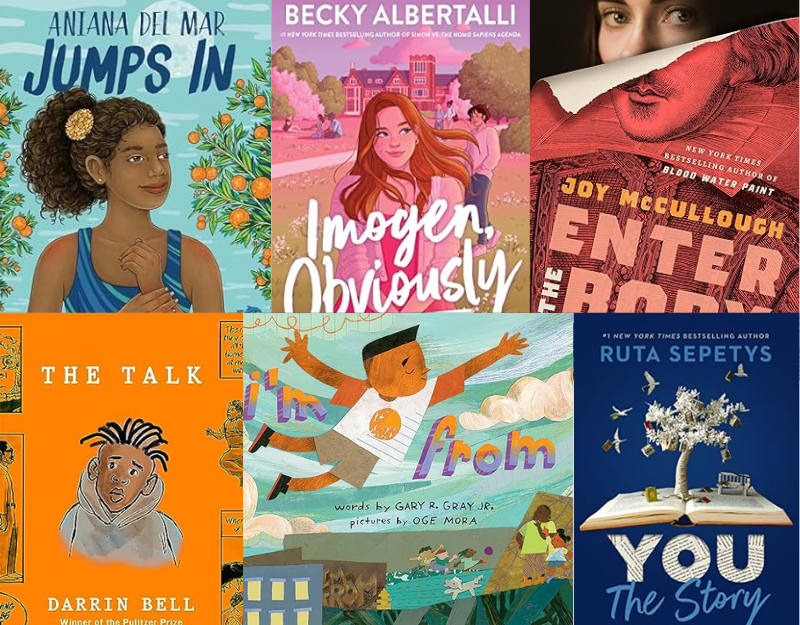Review of the Day: Hold Fast by Blue Balliett
 Hold Fast
Hold Fast
By Blue Balliett
Scholastic
$17.99
ISBN: 978-0545299886
Ages 9-12
I honestly don’t think you can be a reviewer without being honest about your own personal prejudices first. When I pick up a book for children I have to cut through a thick swath of issues infecting my brain that may have little to nothing to do with the book in hand. Maybe I was forced to read Stuart Little when I was a child and that’s why I’ve never liked animal fantasies. Maybe a poorly constructed sports novel burned a small hole in my soul and that’s why this particular baseball novel isn’t ringing true to me. You have to own up right from the start to what makes you tick as a reviewer. So that’s what I’m going to do with Blue Balliett’s book Hold Fast. Here are the facts of the matter. I have read two other books of Ms. Balliett’s in the past and they were not to my taste. That’s fact number one. Fact number two is that when I am disappointed in a book it makes me even more critical of the title than would be normal for me. So read on if you like, but bear in mind that these two facts are at the forefront of this very review. I read Hold Fast by Blue Balliett. I did not much care for it.
Sum, Dash, Early and Jubie. Four people in a single family. Take away one of them? Disaster. That’s how Early feels when her beloved father Dash disappears one night on his way home from the library. The police are willing to believe that he’s just another deadbeat dad but Early knows better. Surely his disappearance has something to do with a side job he got at the library. And what’s the connection to those scary men who threatened her family, forcing them to seek help in one of Chicago’s many shelters? Though she’s just a kid, Early is determined to solve the mystery for the sake of her little brother Jubie, her seriously depressed mom Sum, and the father who might be out there needing her help.
ADVERTISEMENT
ADVERTISEMENT
You might wonder why I would suck on such bitter disappointment with this book right from the get-go when, as I’ve already stated, it wasn’t as if my expectations were high to begin with. But you see my expectations were high. Not because of the author necessarily, but because of the description of the plot. I work in the ultimate urban library system: New York City. I see middle grade books for kids waltz through my library’s doors every single solitary day. Sheer hoards of books are published for children in a given year. Now recount for me all the titles you can think of off the top of your head that deal with the shelter system. Not the foster care system (though that genre could certainly use a kick in the pants as well) but the kids and adults caught up in shelters. In all my years of librarianship I can tell you honestly that I have never read a single solitary middle grade novel, or picture book for that matter, that dared to explain, explore, or inhabit the world of shelters. The children living there might as well not exist for all that they don’t show up in books. So for Ms. Balliett to research and throw herself heart and soul into a book that dares to explore this remarkable topic is to her credit. For that alone she should be commended. And had I not read the book I could have left it at that. But I did read the book. That is where the trouble started.
I recently wrote a post on my blog decrying the lack of African-American male protagonists in middle grade novels (particularly in the publishing year 2013). Balliett’s protagonist is female, but that’s fine and dandy with me. As much as we need boys, we need girls just as much. I’ve never had a problem with an author writing about a character outside their own race. Do your research and avoid the obvious pitfalls and you’ll have my support. “Hold Fast” starts out fine in this respect. The family lives lower-income lives (in part, perhaps, due to Summer’s crippling and understandably untreated depression), just about scraping by until tragedy knocks them flat. But once they entered the shelter my hackles began to raise. With the exception of Summer and an older woman they meet in the shelter with grown children, almost every mother encountered in this book threatens her children with beatings, beltings, slaps, hits, and other forms of physical punishment. About the third time it happened I was getting worried. What precisely are we trying to say here? The rare mom who doesn’t hit her kids is either sunk in depression or gets carted off for drug possession. Is this really what we want to say about the African-American women caught in Chicago’s shelter system? I understand that such physicality occurs, but the frequency went beyond mere personality quirk to commentary. And not a commentary I necessarily want kids to read.
Then there was the small difficulty of Dash’s personality. There is a thin line between the joyous father figure character that supports his children’s hopes and dreams, inspiring them along the way, and a character that speaks almost entirely in platitudes. Dash might have been able to take a page out of the book of Ratchet’s father in This Journal Belongs to Ratchet by Nancy Cavanaugh. A fellow 2013 publication, Ratchet’s dad bears much in common with Dash. Both men have high aspirations for a better world and speak truth to power. Both enjoy wordplay. But while Ratchet’s dad speaks in platitudes on a regular basis, he has a personality above and beyond his aphorisms. More to the point, he has some major character flaws. Dash, in stark contrast, feels less like a real flesh-and-blood human and more like a stand-in for an idea. The self-made man who quotes Langston Hughes is a caricature if not reigned in continually. Dash, unfortunately, is never given any flaws except an excess of misplaced trust in his fellow man. I wanted someone real to worry about. Instead, all I had was a symbol.
That Early has a bit of a Pollyanna in her is almost a necessary character quality. When you’re so beaten down you find yourself trapped without seeing any hope in your situation, you need some kind of inner strength to carry on. She has it in droves, and mostly as a character she worked for me. There were, however, two exception to this. The first was a sequence where Early introduces the joy of reading to the other kids in the shelter. It’s an old-fashioned “reading is fun” portion of the book that didn’t feel right at all. It contained honest-to-goodness lines like, “It’s so fun, like seeing a movie with popcorn, only better, because it stays in your head as long as you want it to and then you can go back and see parts of it again!” Like an after school special had walked into what was otherwise a rather realistic novel. Then there were Early’s interrogation skills. Even a willing sense of disbelief must raise a skeptical eyebrow when a kid asking a grown person questions in conjunction with a crime can make that adult sweat profusely and quail under their directness. That one was a bit hard to buy.
What kills me is that there is so much to potentially enjoy in this book. The idea of using the definition of words as a way of finding clues? That’s fun! The section that rightly points out that it was, “as if you weren’t 100 percent human when you came into the police station on the wrong side of the front desk. If you were upset, it was unreasonable. If you had a question, it could wait. Just the fact that you were there seemed like a strike against you.” That’s good writing. And that’s what kills me. So much of this book works. What sinks it is that the parts that don’t work REALLY don’t work and the bad weighs down the good. If I can’t believe in my characters then I can’t believe in a book. My favorite character in Hold Fast ended up being the setting. In terms of a sense of place, Balliett can’t be beat. You are there. You are with her. You are trapped even as her characters are trapped. But you’re prevented from completely identifying with them. The end result is that you still end up learning a lot about the shelters and the people in them, despite the actual plot. And maybe, in a way, that’s a success that makes the whole book worth it in the end. However you chose to look at it, the bones of Hold Fast could be called strong. It’s the excess that keeps it from reaching what could have been its full potential.
Filed under: Reviews, Reviews 2013
About Betsy Bird
Betsy Bird is currently the Collection Development Manager of the Evanston Public Library system and a former Materials Specialist for New York Public Library. She has served on Newbery, written for Horn Book, and has done other lovely little things that she'd love to tell you about but that she's sure you'd find more interesting to hear of in person. Her opinions are her own and do not reflect those of EPL, SLJ, or any of the other acronyms you might be able to name. Follow her on Twitter: @fuseeight.
ADVERTISEMENT
ADVERTISEMENT
SLJ Blog Network
One Star Review, Guess Who? (#202)
Exclusive: Giant Magical Otters Invade New Hex Vet Graphic Novel | News
Parsing Religion in Public Schools
Take Five: LGBTQIA+ Middle Grade Novels
ADVERTISEMENT








Thanks, Betsy, I really appreciate negative reviews that aren’t just performance art or I-hate-this-book-because-it’s-not-how-*I*-would-have-written-it or look-how-smart-I-am showboating. Meh or bad reviews that actually show why the reader thinks the book didn’t work are HELPFUL for everyone. And while I don’t want to get into the whole “is the world of kidbook/YA reviewing too nice” thing, I will say I’m sick of people I trust telling me privately that they disliked a book but being unwilling to say so publicly. It is a *service* to be a critical critic! And I totally agree with your earlier Paula Willey shout-out, btw.
Eight Grade Super Zero by Olugbemisola Rhuday Perkovich deals with the shelter system a little. The main character doesn’t live in the shelter himself, but he befriends a number of people who do, and the author makes a clear attempt not to treat the people in the shelter as “the other.” I reviewed the book here: http://emilyruthbrown.blogspot.com/2010/05/review-8th-grade-superzero-by.html
Also, I 100% agree with what you said about Dash. I was super excited for his character, because my boyfriend is a high school dropout who started turning his life around when he got a job as a circulation clerk at an urban library. And then I was super disappointed when Dash turned out not to be at all like my boyfriend. But obviously, I’m biased, too 🙂
I read your review with interest because I just finished this book this week. I definitely agree with some of your points. Perhaps I missed this when I read the book, (I actually listened to the audiobook) but my first thought was NOT that the other moms in the shelter system were African American. I also did not pick up that Sum was depressed UNTIL she lost her home and ended up in the shelter with no job and no forseeable way out of the system. My impression was that many of the other shelter parents were overwhelmed and either spent a lot of time sleeping or did indeed yell/hit/threaten their kids. Sum ended up sleeping much of the time too when she could not figure out a way to end her dilemma.
I totally agreed with your interpretation of Dash though. The one point I did want to make about his flaw was that he tried to find a “shortcut” to his dreams but it seemed like he should have known at his age that this extra job was too good to be true.
While the shelter system theme did work for me, the whole “words have rhythms” did not. I just could not see a grown African American man, walking around looking for patterns in words and having a book to write it all down in, etc. By comparison, the main character’s father in “The Might Miss Malone” did love words (“Alliteration!”) but he did it in a much for believable, fun fashion than did Dash.
Overall, I really liked this book and am looking forward to reading her other publications. This is the first one by this author I’ve read.